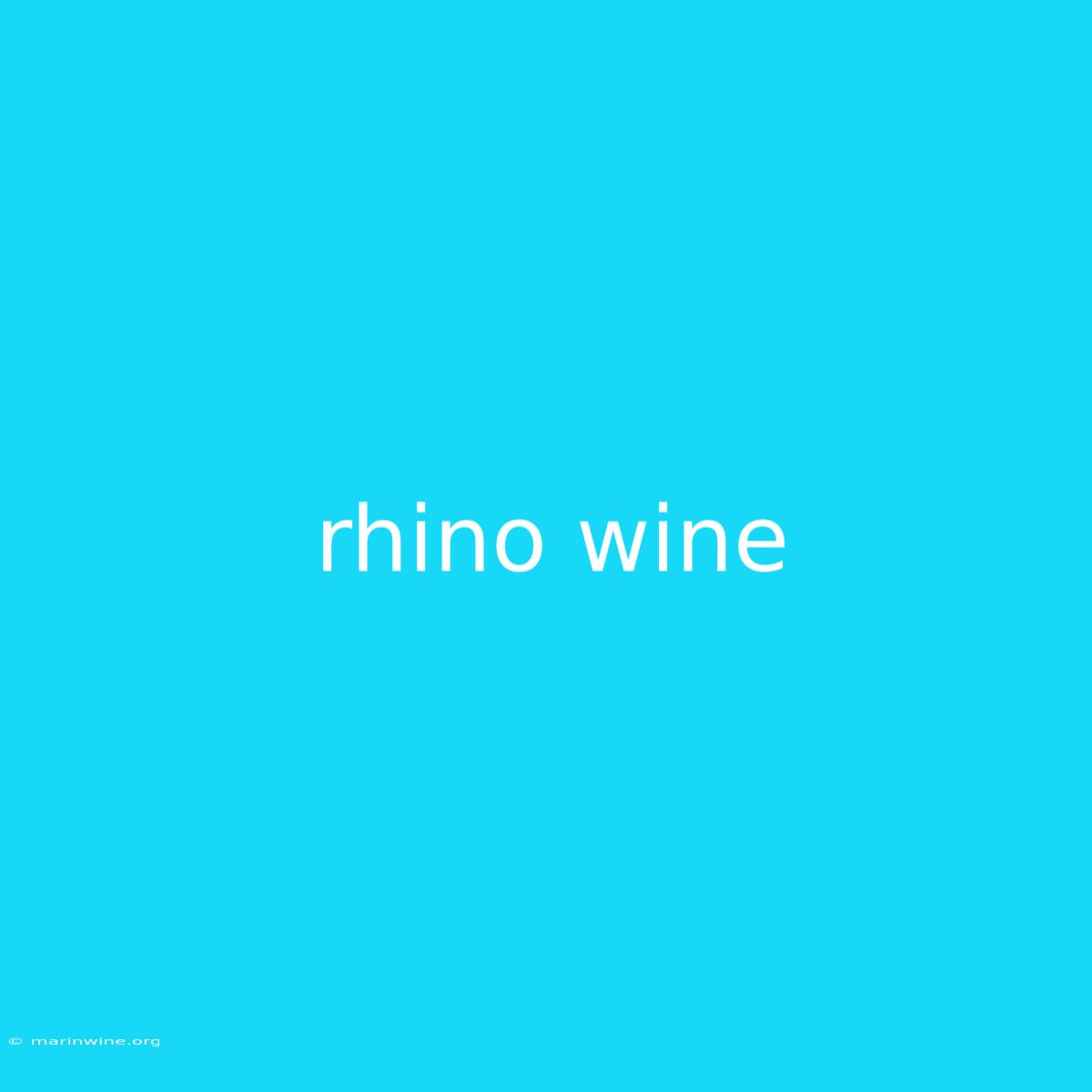The Enigma of Rhino Wine: Exploring the Controversial Elixir
Editor's Note: Rhino wine, a purportedly potent aphrodisiac, has been a subject of debate and controversy for centuries. This article delves into the complex world of rhino wine, separating fact from fiction and revealing the ethical and ecological implications of its existence.
Why It Matters: The demand for rhino wine, often fueled by traditional beliefs and myths surrounding its purported medicinal properties, has driven the illegal poaching of rhinoceroses, placing them at the precipice of extinction. Understanding the history, cultural context, and scientific reality behind rhino wine is crucial to informing conservation efforts and promoting sustainable practices.
Key Takeaways of Rhino Wine:
| Key Point | Description |
|---|---|
| Origin & Beliefs: Rooted in traditional Asian medicine, rhino horn and wine are often believed to possess restorative and aphrodisiac qualities. | |
| Scientific Evidence: There is no scientific evidence to support any medicinal benefits of rhino wine. The supposed aphrodisiac effect is purely a myth. | |
| Ethical Concerns: Rhino wine production relies on the illegal hunting of endangered rhinos, perpetuating the decline of this species. | |
| Conservation Efforts: International conservation groups work tirelessly to protect rhinos from poaching and promote sustainable practices. |
Rhino Wine: A Mythical Elixir?
The belief in the medicinal properties of rhino horn is deeply ingrained in traditional Asian medicine. This practice, often passed down through generations, has created a significant market for rhino horn, fueling poaching and driving rhinos to the brink of extinction. Rhino wine, often made by steeping ground rhino horn in wine or other spirits, is considered a potent aphrodisiac and a remedy for various ailments.
However, scientific studies have unequivocally debunked these claims. Rhino horn is composed primarily of keratin, the same protein found in human hair and fingernails. It has no medicinal properties and is ineffective in treating any ailment.
The Ethical and Ecological Implications of Rhino Wine
The production of rhino wine is a blatant violation of ethical and environmental standards. It is a cruel and barbaric practice that perpetuates the suffering and extinction of these magnificent creatures.
The demand for rhino wine, fueled by misinformation and traditional beliefs, has devastating consequences for rhino populations. Poachers, often operating in remote areas and exploiting local communities, are driven by the promise of large financial gains. This has resulted in a dramatic decline in rhino populations, leaving some species on the verge of extinction.
Conservation Efforts and the Future of Rhino Wine
The fight to save rhinos is a global effort, with numerous international organizations dedicated to conservation and anti-poaching initiatives. These efforts include:
- Anti-poaching patrols: Deploying rangers to protect rhino populations and deter poaching activities.
- Community engagement: Educating local communities about the importance of rhino conservation and promoting alternative livelihood opportunities.
- Law enforcement: Increasing international cooperation to dismantle poaching networks and prosecute perpetrators.
- Demand reduction: Raising awareness about the devastating effects of rhino horn trade and promoting ethical practices.
The future of rhino wine hinges on a shift in mindset. By understanding the truth behind this myth and embracing ethical practices, we can ensure that these magnificent creatures have a chance to thrive in the wild.
FAQ: Rhino Wine
Q: Is rhino wine truly an aphrodisiac? A: No, there is no scientific evidence to support this claim. The belief in rhino wine's aphrodisiac properties is a myth.
Q: Are there any medicinal benefits to rhino wine? A: No, rhino horn contains no medicinal properties. It is composed primarily of keratin, a protein found in human hair and fingernails.
Q: Is the trade of rhino horn legal? A: No, the international trade of rhino horn is illegal and strictly regulated.
Q: How can I help conserve rhinos? A: You can support conservation efforts by donating to reputable organizations, raising awareness about the issue, and avoiding products made from rhino horn.
Q: Why do people continue to believe in the medicinal properties of rhino horn? A: This belief often stems from traditional practices, cultural beliefs, and the misinformation surrounding rhino horn's alleged medicinal benefits.
Q: What are the long-term consequences of rhino poaching? A: The long-term consequences include the potential extinction of rhino species, ecological imbalances, and the disruption of traditional ecosystems.
Tips for Rhino Conservation
- Educate yourself: Learn about the challenges faced by rhinos and the devastating impacts of poaching.
- Support conservation organizations: Donate to reputable organizations working to protect rhino populations.
- Spread awareness: Share information about rhino conservation with your friends, family, and social networks.
- Avoid products made from rhino horn: Refuse to buy any products containing or made from rhino horn, even if they are marketed as "traditional medicine."
- Advocate for change: Contact your local representatives and policymakers to urge them to support rhino conservation initiatives.
Summary of Rhino Wine
This exploration of rhino wine has unveiled a complex story of myth, tradition, and ecological devastation. Despite the persistent belief in its medicinal properties, rhino wine has been proven to have no scientific basis. The demand for this controversial elixir has fueled the illegal poaching of rhinos, driving these magnificent creatures to the brink of extinction. It is crucial to challenge these myths, support conservation efforts, and promote sustainable practices to secure the future of rhinos.
Closing Message: The fate of rhinos rests on our collective responsibility to combat the illegal trade of rhino horn and challenge outdated beliefs. By promoting awareness, supporting conservation initiatives, and embracing ethical practices, we can ensure that these endangered creatures have a chance to thrive in the wild for generations to come.

